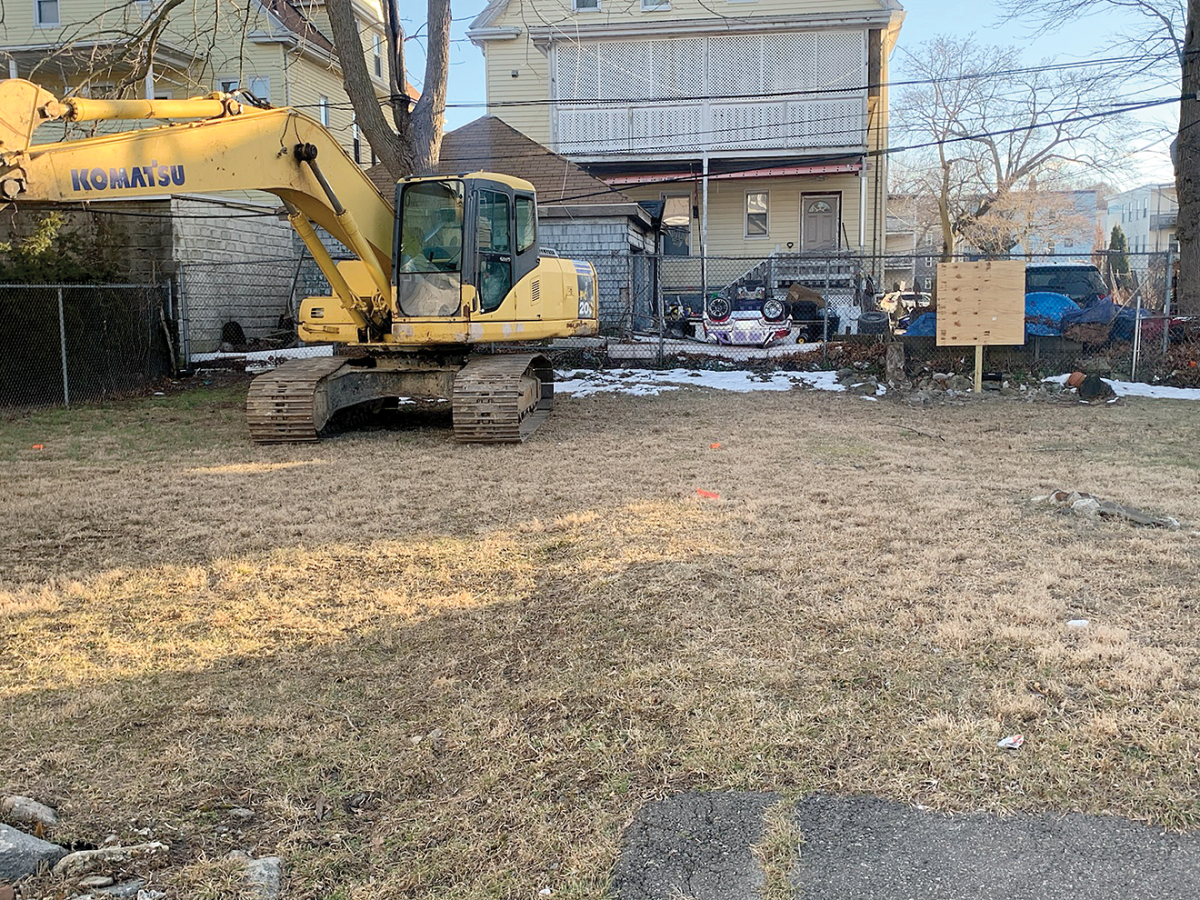March 13, 2024

Carla B. Monteiro fought for, and won a Squatter’s Rights case in reclaiming her backyard on Harvard and Hansborough Streets in Dorchester. Seth Daniel photo
Dorchester resident Carla B. Monteiro nearly lost her backyard.
And were it not for dogged research, an expensive, years-long legal fight, and an against-all-odds win in court by the use of a unique law in her favor, she might be staring out her back windows at a multi-family house instead of the BBQ grill and her son’s basketball hoop that are there now.
Her story has had a long run.
It began on Oct. 7, 2019, when Monteiro pulled into her driveway off Dorchester’s Hansborough Street behind her Harvard Street home that sits across from the former state hospital and her son pointed to a City of Boston notice on their fence. On reading it, Monteiro learned that Shanti Acquisitions had purchased her backyard, where the company planned to build a three-family building on the 4,000 square-foot lot where her son had played basketball, learned to ride a bike, and the family had hosted barbecues and parked their vehicles for nearly 10 years. The notice seemed to indicate she needed to get off the property.
What could all this be about? she asked herself. But instead of fretting or just giving up to an official city notice, she burned the midnight oil that night, researching and learning about “adverse possession,” which is sometimes called “squatter’s rights,” until 3 a.m. And in the morning, she hired a lawyer, Sheryl Furnari, of Bay State Law Group.
“This was the kind of case in law school you look for that is the perfect situation for adverse possession,” said Furnari. “It’s something I read about in first-year law class… [In this case], the reality is that the defendant never saw the land and bought it at an estate sale for pennies on the dollar from an heir to the owner that didn’t care.
“It was the perfect case,” she continued. “I had the perfect witness - an elderly man speaking from his bedroom over Zoom who told the court he had cut the grass, trimmed the apple trees, planted the garden, and had been taking care of the lot all that time.”
The attorney for Solomon Chowdhury, who controls Shanti Acquisitions, Julie Barry, told the Reporter that she was willing to talk about the case, which has been fully decided, but later did not return several emails or phone calls seeking comment on the matter.
For Monteiro, the case highlighted a relatively obscure property law very much applicable in the western parts of Dorchester and in Mattapan where many privately owned vacant lots still exist. These lots, which were abandoned in the 1960s and 1970s, usually after fires had burned the homes to the ground, were without substantial value for 30 or 40 years after the fires, but in the 2020s, with real estate in high demand, they have become very desirable.
While most of the lots are city-owned via foreclosure and are being dispersed under a special, equitable process, others are privately owned, and many times by heirs who have no idea they own them.
In this case, Furnari said, the granddaughter of a former owner appeared out of nowhere in September 2019 and sold the land to Shanti Acquisitions as part of an estate sale for the Gloria Watts family that included a package of five lots. According to evidence produced for an Appeals Court hearing, a family named Poindexter moved into Monteiro’s current home in 1968, a time of extraordinary tumult in the neighborhood. The house next door on Harvard Street burned down in 1971, and the owners disappeared. The Poindexters then cared for the lot and eventually bought it from the city as part of a Boston Yard Sale program.
The lot in question, situated on Hansborough Street, was owned by the Watts family until a fire claimed that house in 1978, and they also disappeared. The Poindexters also took care of that lot, but because the city either overlooked the property or taxes on it were kept current, it was never offered for purchase. Nonetheless, the Poindexters mowed the grass, planted trees, tended a vegetable garden and, eventually, put a fence around the entire property.
That fence was brought into question by the city in 1996, when they cited the Poindexters for building without a permit and took them to Land Court. The case was eventually settled in 1997, and the result was taking out a permit and making the fence fully legal. That small legal action later proved to be a big break in the Monteiro case.
When Monteiro purchased the house from the Poindexter family in 2010, she in turn took care of the lot, did some landscaping to it, and improved it – all the while believing it was her property.
“I was told by the realtors everything inside the fence belonged to [the Poindexters],” said Monteiro. “I asked that over and over, and as a first-time homebuyer I didn’t know to look at parcels. It wasn’t until nine years later someone showed up and claimed that lot was their property. Those that don’t know about their property rights just lose property like this and don’t know what to do, even though they took care of it.”
Furnari notes that a key advantage in Adverse Possession cases is if a defendant has taken care of a property for at least 20 years without permission of the property owner. Monteiro had only been there 9 years in 2019.
“We had to really connect the dots,” said Furnari, “because the person before Carla owned it so long. Most people don’t know it but there is a process called ‘tacking,’ where you can add previous owners that cared for the property before the current owner to get the minimum 20 years. It’s very rare to be able to show and connect those dots.”
Together, Monteiro and the Poindexters had put in more than enough time to use that law, but finding the Poindexters wasn’t easy. Remarkably, Monteiro located and got the cooperation of a son, Thomas, who had lived in the home with his widowed mother for decades and had cared for the lot himself.
“We maintained our home and grounds since April 1968 and all the acquired property, to the abutting lot [on Hansborough Street], not ours, including removal of construction and other buried debris from improper backfill and infill after the houses that were there were demolished,” he both wrote to the court, and testified to in a 2021 Land Court trial that ended in support of Monteiro’s position.
But the legal fight wasn’t the only battle that she was waging. She alleged that she had been harassed and intimidated by agents of Shanti Acquisitions while the case was ongoing. She said the company brought in heavy equipment, like a Caterpillar, and parked it in Monteiro’s backyard. They also rang her doorbell and told her to move her and her family’s cars or they would be towed away. She and Furnari said they threatened to cut down her trees. The harassment ceased only after the judge in the original case issued an order for it to stop, Furnari said.

A photo of the heavy equipment Caterpillar that was driven onto Carla B. Monteiro’s backyard during the Land Court case in 2021. Photo courtesy Carla B. Monteiro
“There was a lot of aggressive behavior toward me trying to intimidate me so I would pull out of the case. There were rumors and all sorts of shenanigans,” said Monteiro.
“I think [Chowdhury] didn’t do his due diligence before buying the land and then wanted to do whatever he wanted,” said Furnari. “He started putting construction vehicles on the land and that’s when his attorney lost control of things. He didn’t have a lot of respect for me.”
But both judges had respect for the case, with the Land Court judge pointing out the fence as a key indicator that the land should belong to Monteiro, and the Appeals Court judge agreeing.
“We affirm,” read that court’s decision in the most simple way.
Monteiro can now rest easy that her backyard will remain her own, and not a development project of Shanti Acquisitions.
“I never wanted to give up my land; it had a lot of sentimental value because I had worked 80 hours a week to save up and went to so many homebuyer classes,” said Monteiro in a recent interview with the Reporter.
“I was a single mom. I didn’t know owning a home was possible but worked really hard to accomplish that goal. I didn’t know I was buying a lawsuit that would dominate my life for years…It was just another sliver of land to him (Solomon Chowdhury], but not to me.”
Over the course of the case, many of Monteiro’s neighbors supported her, coming out to abutter’s meetings and helping her at every turn. Former City Councillor (and now the state’s attorney general) Andrea Campbell and state Rep. Russell Holmes also had her back, which the City of Boston at the time did not. It supported the Shanti bid.
Holmes said in an interview this month that he was proud of Monteiro for fighting for her land – comparing it to other women of color around the country who stood up to the power structure and prevailed.
“She did the appropriate thing and fought for her land and the court agreed with her,” he said.
“The fact that Carla would not allow that to happen is an example for us to learn from and to make sure our community knows their rights and is as prepared as she was,” he continued. “This is a story of wealth, and not losing wealth, and certainly not letting wealth be taken away.”
Monteiro said she grew up in Fields Corner with no yard and playing in the street. The child of a single mother at a time when single mothers were often discriminated against, she recalled her family being evicted because her mom didn’t have a husband.
It was why she decided to buy a house at a young age and worked steadily to that goal until she got the property on Harvard Street, where she provided a home on the second floor for her mother and siblings and rented out the third floor. The two vacant lots, including the lot in the court fights, were something she hoped to build on in the future – with the dream of reserving one of the units for a single mom who needs a break.
When she saw the sign posted on her fence saying that Shanti Acquisitions intended to build on top of her dream, she said it became more than her fight. She spent in excess of $20,000 to make that point but believes strongly that it was worth it.
“This fight was bigger than me,” she says. “I thought about my neighbors and the community and Black people who, in the past, couldn’t buy houses in another area – and the people who have had their land taken by others over and over. I hope this case gives hope for people to fight and not give up.
Villages:


